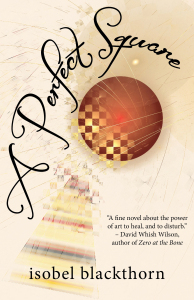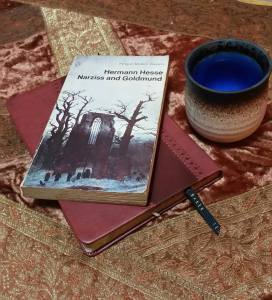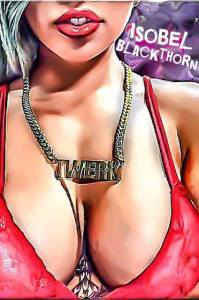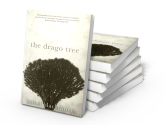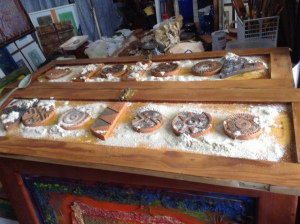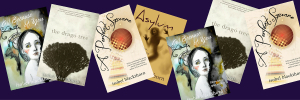Isobel Blackthorn's Blog, page 34
August 22, 2016
A Perfect Square – esoteric fiction
A Perfect Square is on some level an exploration of the different ways people approach esotericism. Who are these people? Where can we find them? Meet the eccentric artist Harriet Brassington-Smythe, her daughter, pianist Ginny Smith, and the mysterious hidden figure of Wilhelm Schmid, a scholar of the esoteric order of the Rosicrucians.
I cannot say that conspiracy theory is a major theme in A Perfect Square, but it does enter into one of the story lines, as mother and artist Judith, alone in an old farmhouse on the Devon moors, explores an internet forum, called ‘The Forum’.
My own thinking on esotericism and on conspiracy thinking goes much deeper. Why do the two go together and how? They are united through two words: elitism and secrecy. Simply put, conspiracy thinking always points to some sort of elite. Esoteric practice creates that elite. Esoteric practice generally occurs in secret. Power elites conduct their business in secret. Conspiracy theorists tend to also have an esoteric bent. Esoteric-minded types will always always look behind the scenes to see if they can see what’s going on. They sense the conspiring. But they get hung up on theories. Why bother? When really, conspiracy theories are themselves just mental traps.
Here’s a piece I wrote for the aptly named Paranoia magazine. Where I have tried to stretch my thinking a little further.
http://www.paranoiamagazine.com/2016/08/mastering-art-occultism/
And as for A Perfect Square, I like to think it packs a punch. Well, that was my intention. At the time of writing I was inspired very much by Umberto Eco’s The Prague Cemetery. Like Eco, I’m motivated by the fact that there is too much misinformation out there, misinformation that easily takes root in minds rendered receptive through a lack of access to alternative and perhaps accurate information. I also marvel at the way opposers, especially those on the Left, get so hot under the collar when it comes to conspiracy thinking, as though it were a personal affront. Or threat?
A Perfect Square is now available for pre-order, which is quite exciting and I’m very grateful to Odyssey Books for choosing to publish the work.
http://odysseybooks.com.au/titles/a-perfect-square-available-29-august/
I’ve commenced work on another novel, one that explores the ideas of Theosophist Alice A Bailey. If you would like to journey with me as I venture further into this strange realm of the unknown, please contact me and I’ll add you to my mailing list.
[contact-form]
Filed under: Uncategorized Tagged: A Perfect Square, Alice Bailey, Astrology, Conspiracy theory, Moon planting guide, Numerology, Occultism, Odyssey Books, Paranoia magazine, Rosicrucians, Steiner, Western Esotericism








August 18, 2016
A Perfect Square coming soon…
There’s been a circularity at work in the creation of my latest novel, A Perfect Square, ever since the ideas first came to me in 2014. The essence of the story was formed out of my daughter Elizabeth Blackthorn’s Honours thesis in Music. Now that the book is written, Elizabeth has composed and recorded the music to go with it. A link to access her work will be included in the book. A Perfect Square will be released in 10 days. Meanwhile Elizabeth created this book trailer. Her mum is forever grateful[image error] X
Filed under: Uncategorized Tagged: A Perfect Square, Elizabeth Blackthorn, Esoteric Fiction, Flow, Kandinsky, Metaphysical Fiction, Odyssey Books, Synaesthesia, Visionary Fiction








August 16, 2016
On ‘Narziss and Goldmund’ by Hermann Hesse
First published in 1930, Narziss and Goldmund forms part of a profoundly insightful body of work by Hermann Hesse.
I visited Goodreads and was not surprised to find well over a thousand reviews. I’ve only read the first few, and I’m left wondering what I can add that would contribute to the collective understanding of this work.
I will admit I am not a scholar of literature or history, nor have I read any biography of Hesse. I first came across his work in my twenties and devoured Steppenwolf and The Glass Bead Game among others. Back then I had not a clue about the spiritual path or western esotericism. But decades have passed and now I do, and it is with fresh eyes that I can perhaps see what Hesse might have been trying to achieve.
In Narziss and Goldmund, Hesse presents the reader with two sorts of spirituality and the two paths that unfold from each. Narziss is destined to be the Abbott of a cloister. He is a philosopher, a thinker, living close to God in the realm of the abstract mind. He is the archetypal master of wisdom.
His pupil, Goldmund, is at odds with himself. Memory of part of his childhood is denied him and when he awakens to it, he begins a journey of self discovery that takes him away from the cloister and out into the world. Not the ordinary world of duty and work and family and community. His reality is akin to Arjuna in the battlefield, as written in the Bhagavad Gita; a journey through the realm of extreme emotions, with desire and lust on the one hand, and death in all its forms on the other.
So intense are Goldmund’s responses, that at first he cannot find meaning. But eventually, as he journeys into and through the experiences that befall him, he does. He is a seeker, and the journey is an initiatory one, culminating in the realisation that we transcend the ravages of the emotions through the faculty of imagination, and its finest expressions in art.
Those who resonate with this story are engaging with a work of visionary/metaphysical fiction of enormous profundity. Those who see past the compulsions and shallow satisfactions of the flesh; detect the irony in Goldmund’s relentlessly questioning mind; see into his frustrations and emerging detachment; may understand that through his character, Hesse is portraying the most fundamental pairs of opposites upon which human experience is cleaved: woman and man; lust and death, passion and intellect, good and evil.
And the esoteric thinker will also understand Hesse’s portrayal of the transmutation of the emotions through the faculty of imagination; the image maker within, existing on the plane of intuition, sees in patterns, in completed wholes; thus it is through the harnessing of this faculty of the soul through the imagination that the artist stills the emotions and imbues them with the stamp of something transcendent and universal. And so it is through this process that the pairs of opposites may sit in loose unity.
I’ve long admired Hermann Hesse’s work. I resonate with it now more strongly than ever. As an author I’m in awe of his achievement. Narziss and Goldmund is not a piece of entertainment; it’s a literary portrayal of the spiritual path.
Filed under: Uncategorized Tagged: Alice Bailey, Arjuna, Bhagavad Gita, Book review, Hermann Hesse, Narziss and Goldmund, Spirituality, The spiritual path, Western Esotericism








August 15, 2016
‘Conspiracy?’ – Hijack it back
There is no doubt in my mind that the word ‘conspiracy’ has been hijacked. We can’t even think of it without adding ‘theory’ and pointing derisively at what we believe to be whacky ideas and the whacky folk who ascribe to them. Say ‘conspiracy theory’ and you immediately make an argument illegitimate. The door is sealed. There’s no way we’re going there.
The word ‘conspire’ means “to collude; to act in unison or agreement and in secret towards a harmful, deceitful or illegal purpose.” WordNet. In essence, conspiring veers in the direction of criminality. It goes hand in glove with corruption. And it is a method or praxis that has been employed by the power elite since the words ‘power’ and ‘elite’ existed. Game of Thrones is premised on it. Monarchies thrive on it. And today, the new corporate elite have established for themselves a raft of institutions premised on it. Conspiring is simply ‘business, as usual.’
There’s nothing fresh in what I’ve just said. But I’ve just finished reading ‘Suiting Themselves: How Corportions Drive the Global Agenda’ by Professor Sharon Beder and I’m reminded yet again of how effectively the power elite are getting away with what they are doing, and how the maligning of ‘conspiracy theory’ has effectively closed off much of the debate that would enable most of us to see and oppose it. Instead, we watch on as the Anonymous crowd with their V masks protest against the ‘new world order’ and we sneer.
Written in 2006, and therefore before the GFC, Beder details meticulously the motives, the aims and the manner whereby a dense web of corporate networks have emerged over the last fifty years. How a small cluster of corporations (including pharmaceutical companies, oil companies, banks) have fashioned for themselves foundations, think tanks, research institutes (within universities), government advisory groups and policy groups, all with the aim of influencing or controlling the national government agenda. America, Australia, New Zealand, Britain, all transformed themselves in the 1980s and laid themselves bare to the wanton corporate possession of the nation state, otherwise known as ‘free market economics’.
The same sorts of organisational bodies exist at the global level with the aim of setting the global agenda, from the World Trade Organisation, the International Monetary Fund and World Bank, along with the Council on Foreign Relations, Bilderberg Group, and so on.
The corporate and government realms are so intertwined that former politicians move quickly to positions of boards of directors, only to re-enter politics at a later date. Sophie Mirabella’s appointment to Gina Reinhardt’s Hancock Prospecting is just one of numerous examples.
Even this brief synopsis of the state of play reveals collusion, and acting in unison or agreement and in secret. We know that these organisations exist. On some level there is transparency. And we know the consequences of much of their agenda as it plays out in our lives. What is a little harder to prove is whether all these various corporate organisations are behaving in ways that are harmful, deceitful or illegal.
Yet time and again corporations act to suit themselves. They make decisions to increase their profits. In so doing, they place limits on the rights of the rest of us, and the planet. Anyone in any doubt can read Sharon Beder, Sheldon S Wolin, Antony Loewenstein, Arundhati Roy, or any number of writers who depict the actions of such corporations.
The way to hijack back the word ‘conspiracy’ is to use it differently. What I am alluding to does not come under the term ‘theory.’ It is not supposition. What I have described here simply is, and it’s a process. A process with key players and various individual motives. There might be plots and plans and all manner of hidden agendas – who knows? But that is not my point. The power elite conspire. So we need to be brave enough to hijack back the word and say they are ‘conspiring.’ Let the word be a verb and point to the activity. It is a powerful word that points to things going on behind our backs, things that are most definitely not in our best interests.
Filed under: Uncategorized Tagged: Anonymous, antony loewenstein, Arundhati Roy, Conspiracy theory, New World Order, profits of doom, Sharon Beder, Sheldon S Wolin, Sophie Mirabella








July 28, 2016
Author Interview – Felicity Banks
I’m delighted to welcome to my blog, Steampunk author Felicity Banks whose debut Heart of Brass is released today! Happy Publication Day!!
At what age did you start writing?
I was seven years old the first time I attempted to write a novel. It featured cats, naturally. I have two children of my own now, which has given me a new perspective on the many illegal activities of my heroines. My daughter is four, and an excellent storyteller. She once told me she couldn’t go and wash her hands because there was a bear in the hallway. That was the beginning of many hours of free entertainment for me. My son is two, and loves the absurd and fantastic. He once drew a picture of me with wings, so I could fly. I also have a cat who brings live mice into the house and does her best to pretend she’s the injured party.
I’ve written fourteen books altogether, not counting an ever-increasing number of Choose Your Own Adventure-style interactive books (all of which are listed and linked under “Felicity Banks” at the Interactive Fiction Database ifdb.tads.org).
“Heart of Brass” was my third book to be accepted, but the first to be published.
Because the interactive fiction world moves faster than the world of print, “Heart of Brass” already has two interactive sequels. “After the Flag Fell” is included with the novel (the main character is one of the minor characters from the novel), and “Attack of the Clockwork Army” is available as an app through various platforms (it allows you to play as one of Emmeline’s siblings, if you wish). Right now I’m writing an huge interactive tale set in the same universe as “Heart of Brass”, but it is set in 1837 Britain (before Emmeline was born) and doesn’t involve Australia (or spoilers). It will begin release on 17 August 2016, with a new section of the story released as an app each week for forty weeks. The publisher is Melbourne-based company Tin Man Games.
I’m delighted and astonished at the huge number of people who are obsessed with app-based interactive fiction. After all these years of writing, I suddenly find myself with readers around the world waiting for my next story!
What’s your background? Where are you from?
The answer to both is Canberra. It’s the middle of July now and I’m in my annual semi-hibernating state until September.
Who are your favourite authors? Who Inspires you?
I adore Garth Nix’s Abhorsen series, Pamela Freeman’s Castings series, Philip Reeve’s Larklight trilogy, anything by Gail Carriger, Scott Westerfeld’s Leviathan series, the Narnia series by CS Lewis, the Samurai Kids series by Sandy Fussell, anything by Naomi Novik, the Quarters series by Tanya Huff, the Jane Yellowrock series by Faith Hunter, the Woodcutter Sisters series by Alethea Kontis, the Fairyland series by Catherynne M. Valente, the Wind on Fire trilogy by William Nicholson, and so on!
I usually read young adult fantasy, because I like a fast-moving plot that also gives me the sense that absolutely anything could happen. Plus young adult books usually (although not always) have less intense sex and violence. I realised quite a while ago that I get terribly bored writing anything without magic, so my own steampunk tales also feature a unique magic system.
Tell me a little about heart of brass.
I really wanted to write a steampunk story set in Australia—the land of droughts, dreamers, bushrangers, gold rushes, convicts, etc. But I’m not a historian! So before I even wrote an outline I started by reading, reading, reading. Some of my favourite non-fiction writers are Liza Picard (“Victorian London” is wonderful), Krista D. Ball (“Hustlers, Harlots, and Heroes” is as good as it sounds), Ruth Goodman (“How to be a Victorian”, including her own experiments), Susanne Alleyn (“Medieval Underpants and Other Blunders”, which is surprisingly useful for the Victorian Era), Bill Bryson (“At Home”—Bryson usually writes funny travel books), and Geoffrey Blainey (for absolutely everything Australian). My overwhelming impression from all the research I conducted was that history is far madder than you might think. Cross-dressing (both ways)? Mad scientists? Bizarre contraptions? Famous lesbians? Charming rogues? Cannibalism? Villains? Heroes? It’s all there.
Heart of Brass is a tale of a convict woman whose life was ruined by one small crime… but who quickly discovered that her life wasn’t ruined after all. It’s a tale of a nation and a person realising that high society isn’t all it’s cracked up to be. It’s a tale of daring escapes, duels, and literal flight. It’s an Australian story through and through, despite and because of the fact that none of the characters think of themselves as Australian. It’s a tale about a heart that’s powered by magic and steam, but is just as faulty and inconvenient as the usual kind.
heart of brass
Emmeline Muchamore is a well-bred young lady hiding explosive family secrets.
She needs to marry well, and quickly, in order to keep her family respectable. But when her brass heart malfunctions, she makes a desperate choice to steal the parts she needs to repair it and survive.
She is unable to explain her actions without revealing she has a steam-powered heart, so she is arrested for theft and transported to Victoria, Australia – right in the midst of the Gold Rush.
Now that she’s escaped the bounds of high society, iron manacles cannot hold her for long.
The only metal that really matters is gold.
Felicity Banks is a Canberra author specialising in fantasy and interactive fiction, including several Choose Your Own Adventure-style stories that take place in the same magical steampunk universe as Heart of Brass. All her interactive fiction is listed under “Felicity Banks” at http://ifdb.tads.org and most of her interactive fiction can be read as an app.
Heart of Brass is her thirteenth completed novel, her third novel accepted for publication, and her first novel to be published.
The Antipodean Queen Series facebook page is at https://www.facebook.com/Antipodean-Queen-Fantasy-Steampunk-Books-1123139861084253
https://felicitybanks.wordpress.com/2016/07/21/heart-of-brass-cover-reveal/
http://odysseybooks.com.au/titles/9781922200587/
YOU CAN BUY A COPY HERE
Filed under: Uncategorized Tagged: Felicity Banks, Heart of Brass, Odyssey Books, Steampunk








July 20, 2016
Peace be upon us all
It was an ordinary day in September. Summer was nearing its end and a I was about a month into the first time of the new school year. The school day had ended and I walked in the staff room. A few colleagues had the telly on and they were glued to it. I went over to see what was so compelling viewing.
The camera was fixed on the Twin Towers. There was smoke and blast debris and people were screaming. I watched as the tower fell. It all happened in slow motion. Nothing made much sense.
The school where I taught was solid working class and white. I was a teacher of Religious Studies. I had four classes of Year 8s and the term topic was Islam. We’d been having a lot of fun with it. We’d studied the five pillars and my classroom was decorated with a frieze of Islamic-style art that the students had created for homework. We’d discussed the essence of the faith, as best we could understand it. We’d been having a fabulous time. There were a lot of points of difference but we collectively chose respect. We knew that none of us were about to answer the call to prayer, but we rather liked Zakat, the giving of alms.
That was 2001. The day the world cleaved. Looking back on events since, it’s little wonder theories abound as to who was behind it. Something so pivotal, so worldview shattering, so utterly incomprehensibly devastating and so intricately planned had to be the work of someone at least a little bit clever.
What anyone with eyes can plainly see is how the world has changed and that event triggered it. Bang! A whole system flip. Warmonger Bush went to war with Afghanistan and then Iraq off the back of it. Homeland security and the Patriot Act and the hellhole that was Guantanamo Bay. The war on terror began. The axis of evil was created. And Islamophobia became the order of the day. Never mind the devious and evil plotters who created 9/11. Pay attention to the way it was used, to the hysterical, nonsensical corrupt moral outrage that ensued.
Even a moderate politician like Former WA Premier Carmen Lawrence will tell you that the best way to control a population is to rule by fear. So when Waleed Aly admits to his own apprehension in the face of Sonia Kruger’s ‘ban Muslim immigration’ statement, it’s easy to see how successful the campaign has been.
The way to deal with terror attacks is through education and the fostering of right human relations. Not through the rhetoric of war. Fighting terrorism is a ludicrous stance to take. Since when did fire put out fire? Yes it’s appalling when a guy in a truck barrels into innocent people celebrating on a beach. But that guy, and others like him, are emerging out of the spoils of wars the west declared. They are emerging out of geopolitical battle lines. They are emerging out of the ideology promoted by western-backed Saudi Arabia in the form of Wahhabism. They are emerging out of a deep frustration with white supremacist America imposing its will and its values on the Middle East. We need to understand this bigger picture. We need to understand that the killings, the bombings, the devastation is happening every day not in France, or Britain or Australia, but over there in Iraq, in Syria, in Yemen. We need to face up to the fact that we as citizens of western nations have blood on our hands too. I’m not a high school teacher any more, but if I was these are the things I would teach. I’d risk my career over it.
We can try to resist the fear. Choose not to make religion a reason not to be someone’s friend. We can realise that 1.6 billion believers are not a minority group. We can abandon our implicit white supremacist stance and start behaving like human beings with the hearts we were given.
Or we can head down the path we are on. It’s the path to fascism without a doubt. It’s also the path to World War III which was always going to be fought in the Middle East. Didn’t take a soothsayer to work that one out. Some, like Pope Francis, say it’s already begun. We’re just slow to recognise it. It’s this very failure to recognise the gravity of the situation, this lack of ability to rise up out of the fear soup we’re drowning in, that will ultimately be our downfall.
Filed under: Uncategorized Tagged: #sendforgivenessviral, Islamophobia, Religious Studies, right human relations, Sonia Kruger, Waleed Aly, World War III








July 13, 2016
Twerk
Today Backhand Stories published my first work of flash fiction, Twerk.
Twerk is a vivid portrayal of a stripper giving a punter a lap dance.
Enjoy!
Filed under: Uncategorized Tagged: Backhand Stories, flash fiction, sex industry, sex workers, Twerk








July 12, 2016
The BentoNet book revolution
https://www.thebentonet.com.au/index.php/vendor-shop/odysseybooks.html/
There aren’t too many participating bookstores as yet, but it really is early days. The point is that you can buy a title online via the BentoNet website and collect it from your local bookstore. How amazing is that! You’ll be paying the Recommended Retail Price (RRP) as set by the publisher and shipping is only a couple of bucks, about a 1/4 of standard postal rates.
BentoNet helps to give small presses a share of the market. Bookstores, swamped by the large press catalogues, don’t have the time or energy to check out the book catalogues of small presses. BentoNet gets the books published by small presses right under the bookstores’ noses. And of course the bookstore has made a sale.
Small presses using the ethical Print on Demand business model currently have to run at a loss to get their books stocked in bookstores, because traditional book distributors take such a huge % cut of the RRP. BentoNet gives small presses a chance to distribute their titles to customers via bookstores, keeping costs to a minimum.
The other thing most don’t know about the book industry is that bookstores run on a sale or return basis. Those unsold books, usually shop worn, are returned to the publisher and then pulped. It’s unethical and the only way to make the business model viable is for publishers to go for large print runs (so that the unit cost is small) and focus on best sellers to spread the risk.
Small presses can’t do a large print run, they’d go broke, and because small print runs and Print on Demand pushes up the unit cost, they can’t absorb the risk of the return of unsold books – it’s just too costly. They also don’t have the market clout to ram titles down our throats and make them bestsellers by swamping mainstream and social media.
If you are in with a bookstore, go nag them about this! Let’s make a revolution happen.
I sound like an advert, but no one is paying me to say this. I currently have 3 titles with Odyssey Books and a 4th due out next month. So call it enlightened self interest. All I know is that I’m really excited about this new venture. I hope it works.
Filed under: Uncategorized Tagged: BentoNet, Book distribution, Odyssey Books, small presses








July 10, 2016
The real Domingo
In the late 1980s I lived on the volcanic desert island of Lanzarote. When I wrote The Drago Tree in 2013, I had no idea the story would take me back.
In The Drago Tree I created a character, Domingo, in homage to the real Domingo and the friendship we once had. Call me a sentimental old fool if you will. I had no idea that I would reconnect with this friend who has now grown in me larger than life.
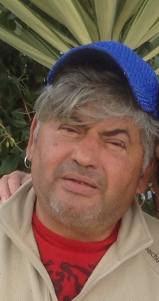
domingo diaz barrios
I left Lanzarote in 1990. I was 28 and unbelievably stupid. I threw away a life that made my heart sing, and every cell of me feel alive. I left an island so ingrained in me that I’ve grieved the loss ever since. I had recurring dreams that I’d go back. I played Taburiente and I wept.
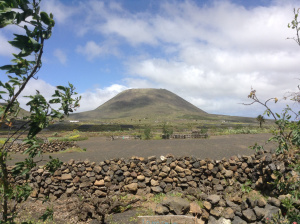 view from where i was staying
view from where i was stayingIn March this year I sat at Domingo’s kitchen table. I was there the whole day. By the end of it my mind was aching from the effort of listening to his Spanish. And in the few days we spent together in his kitchen and his studio, I saw something precious. Something I had taken for granted, my best friend all those years before; a pearl, and I’d spat him out like a piece of grit.
 domingo’s art
domingo’s artTwenty-six years on and there I was in the company of a man indigenous to the island, an inspired and prolific artist, an ambassador of his culture, embodying all the values I hold dear and a few more besides. Maybe it was the intensity of the moment, the thrill of the reunion, the poignancy of the inevitable parting, the loss of all those years between, but in those moments I felt twinned, as though he was the other half of me.
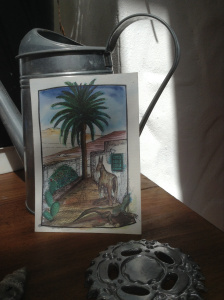 one of the numerous momentos he gifted me
one of the numerous momentos he gifted meWhile I was on the island I was asked why I chose to write novels set there. Was I profit-driven, with an eye on a market? It was a shocking question. I wanted to tell the questioner, how can I not write about an island for which I feel such passion? Why would I want to write about somewhere else and risk the chance to make the epic journey back there all the way from Australia, a chance to spend a little more time with my friend?
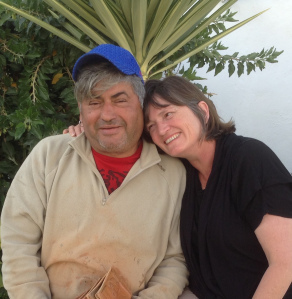 saying hasta luego
saying hasta luegoYeah, cool me a sentimental old fool. But we only get one life. And sometimes we just have to reclaim the things that are important to us. I guess I am lucky that I still can. Today is his birthday.
Felicidades Domingo X
http://domingo-har.artelista.com/
Filed under: Uncategorized Tagged: Canary Islands, Domingo Diaz Barrios, Haria, indigenous art, Lanzarote, The Drago Tree








June 28, 2016
Bookish winter sale
Buy a signed copy of Asylum or The Drago Tree and get a second book of your choice for half price. For a limited time only. While stocks last. (I sound like Harvey Norman) Hurry, don’t miss out.
Express postage to anywhere in Australia.
Overseas postage can be arranged.
Asylum AU$22.95
The Drago Tree AU$23.95
All Because of You AU 14.95
You can check out my books here
And read all kinds of nice things others have said about them on Goodreads
Join the Facebook event here
[contact-form]
Filed under: Uncategorized Tagged: All Because of You, asylum, Book sale, Isobel Blackthorn, The Drago Tree









